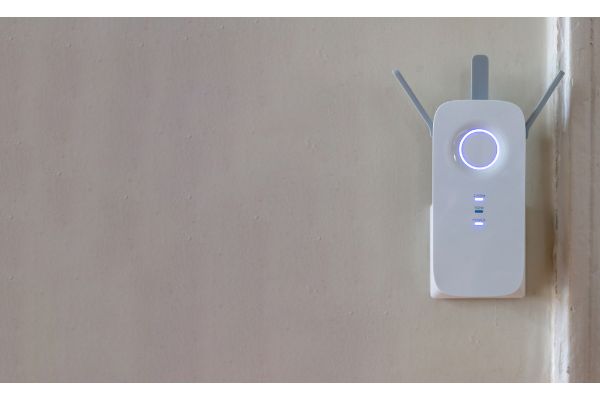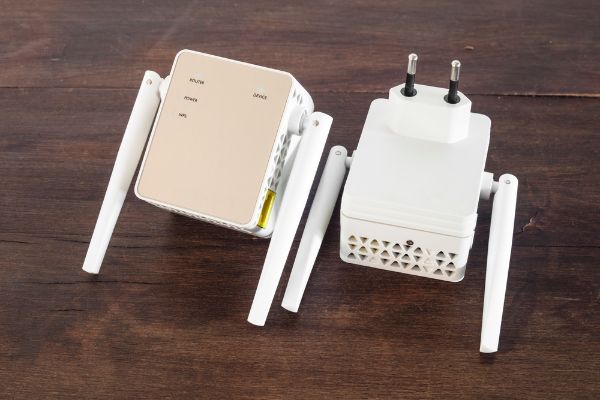Disclaimer: This post may contain affiliate links, meaning we get a small commission if you make a purchase through our links, at no cost to you. For more information, please visit our Disclaimer Page.
Wireless access is one of the chief ways that people choose to get online today. Whether you’re operating a business or just need access at home, having all of your devices connect wirelessly is quite convenient. Furthermore, your electronics that you take with you, such as smartphones, will remember your Wi-Fi data and reconnect to the network by themselves once they are in range of the signal again.
However, the typical broadcast range for a single Wi-Fi network signal can be rather small. In large office spaces or big houses, it may be hard for devices to get that signal. This is particularly true if there are multiple floors in the building, and the signal might have trouble penetrating very many floors in either direction to reach your devices.
For this reason, developers created Wi-Fi extenders. As the name suggests, these units take a Wi-Fi signal and boost its given range over the area. However, some people still have other questions about how Wi-Fi extenders work, and we will try to address five of the main ones today.
As we go along, we’ll discuss the differences between extenders and routers, whether the extender you have might work as a router itself, how these devices can interact with mobile hotspots you create, and what types of data extenders might need to use in order to function. As we wrap up, we’ll talk about whether you should leave your extender online all the time, too.
Table of Contents
Is a Wi-Fi Extender the Same as a Router?
No, Wi-Fi extenders tend to work closely with routers, but they are not the same thing. Although you probably have at least one router in your home or office already, it may be a good idea to go over some of the specifics of what a router does. That way, you can see the differences between these two pieces of technology more clearly.
For wireless access, a router is probably one of the main things you’re going to use to get online. You’ll do so in conjunction with a modem, but there are dual models out there that combine a router and a modem into a single unit, too.
When you sign up for service with an internet provider, they’ll give you a modem in order to bring a single signal into your home or office. Once you get that signal, you can connect a device like a laptop to the modem directly via a cable. However, you probably have multiple devices that need internet access, and not all of them can just connect to your modem directly.
This is where routers come into play. A router will get the signal from your modem and send it out so that multiple devices can use the signal at once. Thanks to the bandwidth you pay for from the service provider, you can have several devices that maintain online access at the same time.
An extender does work with a router, but it does not create the signal that your devices need. Instead, it tries to increase the strength or range of the signal, and the aim is to allow more devices from further away to connect to the internet.
The devices closest to your modem or router should get the strongest signals. However, the signal can weaken the further away your electronics get from it.
Obstructions like walls and doors can also impact this signal strength. Part of the extender’s job is to get the signal past all of this and let devices that might otherwise get only a weak signal connect to the home network.
Can a Wi-Fi Extender Work Without a Router?
Generally, a Wi-Fi extender needs a router signal in order to function properly. Much of this has to do with how extenders work. They don’t create their own signal, and they look for one to strengthen.
Different kinds of extenders can perform various functions, and not all need a router to do their jobs. However, even these devices still need access to some kind of Wi-Fi signal they do not create themselves. Therefore, they have to work with another device that will offer such a signal.
For example, some digital cameras can produce Wi-Fi signals to work with tablets or phones. A Wi-Fi extender could allow the phone or tablet to be a greater distance from the camera that is producing the signal while still being able to see and connect to it.
In this scenario, the extender is not reliant on a router by itself, but it is trying to get and boost a Wi-Fi signal from another device. The camera in question might also be getting its own Wi-Fi access from a router.
Can You Use a Wi-Fi Extender With a Mobile Hotspot
Yes, you should be able to use an extender and a mobile hotspot. As we touched on already, the Wi-Fi extender needs to see an existing network. Once it does, it can connect to it to expand its range.
Although it should be perfectly fine to use such a device in tandem with an active hotspot, it is important to keep a couple of things in mind:
1. The extender’s actions will probably decrease signal speed. You should get better range overall, but the speed at which data transfers between devices could be more limited than you realize.
If you plan to use a mobile hotspot as the access point, and if the extender decreases the speed significantly, some of your devices may have trouble running apps requiring higher speeds.
2. Typically, mobile hotspot data has limitations that the carrier places on it. This can be true even if you have an otherwise unlimited plan for all the rest of your data. As such, the time you can use a signal extender with a hotspot could be shorter than you might need.
Once you exceed the hotspot data limits, you may have to find another way to get the extender to work. You could pay extra to purchase more hotspot data, but this option will depend on what the provider offers.
Does a Wi-Fi Extender Use Data?
Yes, the extender needs to use some sort of data. However, the device is not necessarily using data by itself. It will use the same data as the Wi-Fi signal it grabs and extends.
This may be an easier concept to understand if we look at a specific hypothetical that can illustrate how the different devices in your home might use the data from your ISP.
In our example, we’ll assume that you want an extender so that your phone can access your home Wi-Fi network from several floors above where you have placed your router.
You might do this if you live in an area with poor coverage, too. In either case, the extender takes your home Wi-Fi signal and ensures the phone can grab it.
If you use your phone to do anything on the internet, it will count as something that goes to whatever data cap you might have on your wireless plan. In order to avoid using up too much data, you may need to make sure that you turn off Wi-Fi and use only cell data over LTE.
However, this depends on how much data you use. The extender itself will also be a client device, and many hotspot settings have limits on how many clients they will accept at once.
If you are just using your home internet service for the same sorts of surfing or streaming activities as you normally do, you should not see a significant increase in your use of data per month just because an extender is active.
The Wi-Fi extender talks to your router to get a signal, but it doesn’t talk to the internet. This means that, although it must use data to send and receive signals, it should not add to the data you are using overall.
Should You Leave a Wi-Fi Extender on All the Time?
The situation is conditional and very much up to the individual user. If you get weak signals in certain parts of the home and want to make sure all devices in that area will have stronger ones, it may be a good idea to leave the extender on.
In contrast, if you only need it for certain situations or events, there might be nothing wrong with shutting it off. Keep in mind, however, that you’ll be back to the original range and possibly weak signal of your home Wi-Fi until you connect it again.
Should your concern be more about power consumption, a fully active extender should not consume much energy, and this should be true even if you leave it on a lot.
Conclusion
Home Wi-Fi networks are convenient for getting most people online quickly and easily. They’re also great for making sure that acquaintances and guests can have a good signal when they visit you, and they won’t need to use data on their plans to get it.
However, some people may have connections with weak, narrow signals.
Should this be the case for you, an extender might help. They are not the same as routers, but they work closely with them. You can also use them in conjunction with hotspots. Thanks to low power consumption levels, you can keep them active all the time to boost the signal, too.


